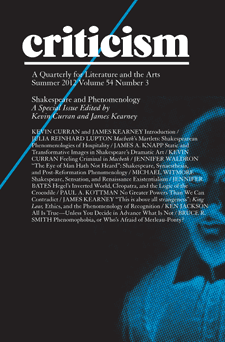Volume 54, Issue 3 (2012) Shakespeare and Phenomenology
Introduction
It might seem strange to devote a collection of essays to "Shakespeare and Phenomenology" in the second decade of the twenty-first century. After all, phenomenology as a philosophical movement had its heyday in the middle of the twentieth century. But phenomenology's demise as a major philosophical movement has enabled it to live on as the approach or method shorn of dogma that its earliest practitioners promised. Far from being a single school of thought, phenomenology now looks more like an intellectual diaspora, a galaxy of related but discreet propositions that share basic assumptions while pursuing different philosophical projects. In early modern and Shakespeare studies, we have seen a particularly robust variant of phenomenology in the past ten years in the practice of historical phenomenology. In this special issue, we attempt to build on the successes of historical phenomenology by pursuing a variety of phenomenological approaches and practices in relation to Shakespeare and the early modern. By embracing phenomenology's remarkable intellectual diaspora, we hope to offer a new critical agenda for phenomenologically inflected reading of Shakespeare. We propose that phenomenology offers a language of speculation and inquiry dynamic enough to accommodate both historicism and theory, a common language that can speak as compellingly to questions of law, ethics, performance, and hospitality as it can to questions about feeling and sensation. Accordingly, "Shakespeare and Phenomenology" is not invested in carving out yet another subfield of Shakespeare studies. On the contrary, in this collection we are committed to opening up conversations among subfields and to imagining a common critical future.
Preface
Introduction
Kevin Curran and James Kearney
Articles
Phenomenology and Hospitality: Macbeth's Martlets: Shakespearean Phenomenologies of Hospitality
Julia Reinhard Lupton
Phenomenology and Images: Static and Transformative Images in Shakespeare's Dramatic Art
James A. Knapp
Phenomenology and Theater: "The Eye Of Man Hath Not Heard": Shakespeare, Synaesthesia, And Post-Reformation Phenomenology
Jennifer Waldron
Phenomenology and Life: Hegel's Inverted World, Cleopatra, and the Logic of the Crocodile
Jennifer Bates
Phenomenology and Ethics: "This is above all strangeness": King Lear, Ethics, and the Phenomenology of Recognition
James Kearney
Afterword
Shakespeare and Phenomenology
- Guest Editors
- Kevin Curran and James Kearney

